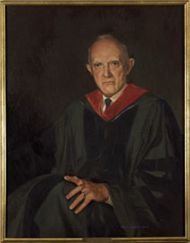Page from the Past
December 04, 2010

Rienk Bouke (R. B.) Kuiper was one of the original members of the faculty at Westminster Theological Seminary, as the first professor of Practical Theology. Recently, we discovered an interesting artifact from the early 1950's - the final years of Dr. Kuiper's time at Westminster before becoming president of Calvin Theological Seminary. On an unidentified radio program, Dr. Kuiper had a conversation about modernism with Rev. Harland Steele.
As you listen to this audio, think about how humanism affects today's culture. How do Dr. Kuiper's examples, which are steeped in the era of the 1950's, relate to present-day issues and concerns?
Listen here to the radio program
To see the books that Dr. Kuiper wrote, visit the Westminster Bookstore
A Modern Tower of Babel
One of the great problems, one of the great questions in the history of the world is under discussion today by two leaders of the Christian church: A pastor, Rev. Harland Steele; Professor of Theology, Dr. R. B. Kuiper. As this issue is discussed, remember, you are involved. You must answer this question, is God God, or is man God?
Steele: This is the question: is God God, or is man God? You know, this reminds me of the building of the tower of Babel back here in the 11th chapter of Genesis. Remember how the people in those days wanted to make a name for themselves? So they built a tower to reach into the heavens. What do you think is the significance of that story?
Kuiper: God had commanded man to replenish the earth. That is to say, to fill the earth. God wanted men to be scattered all over the face of the earth, but men couldn't see it that way, they wanted to defeat the divine purpose. So they build themselves this tower. They wanted to stay within easy reach of one another, perhaps even within sight of this tower. Significantly, we are told this tower was to reach into heaven. Man was defying the very God of Heaven, and that's precisely what we call today humanism.
Steele: You say that the tower of Babel is a striking illustration of humanism. Do you regard this as an isolated instance of humanism in the history of man?
Kuiper: There is nothing isolated about it! This is neither the first, nor the last instance of humanism in the history of the human race. The first instance is recorded in the third chapter of Genesis. Man was living in the Garden of Eden. God forbade man to eat of the tree of the knowledge of good and evil, on the penalty of death. But Satan came into the garden. He asked Eve what would happen to her if she ate of the tree, and she said that God had told her that she would die. Satan said "Nothing of the kind is going to happen to you! You're going to be like God!" That looked good to her, and so she ate of the fruit of the tree, and she gave to Adam, and he also ate. Man really put himself in the place of God in that instance, and that is precisely what humanism amounts to.
Nor was that the last instance of humanism in the history of our race. We must remember that the whole history of humanity is nothing else but a conflict between God and Satan; or, you might say, of God and man under the influence of Satan. Humanism pervades history. That is what we call the great Antithesis, and that is the conflict of the ages. The question simply is this: is God going to be God, or is man going to be God?
Listen here to the radio program
Below is a telegram inviting Dr. Kuiper to the faculty of Westminster Theological Seminary.
Dated May 9, 1933









